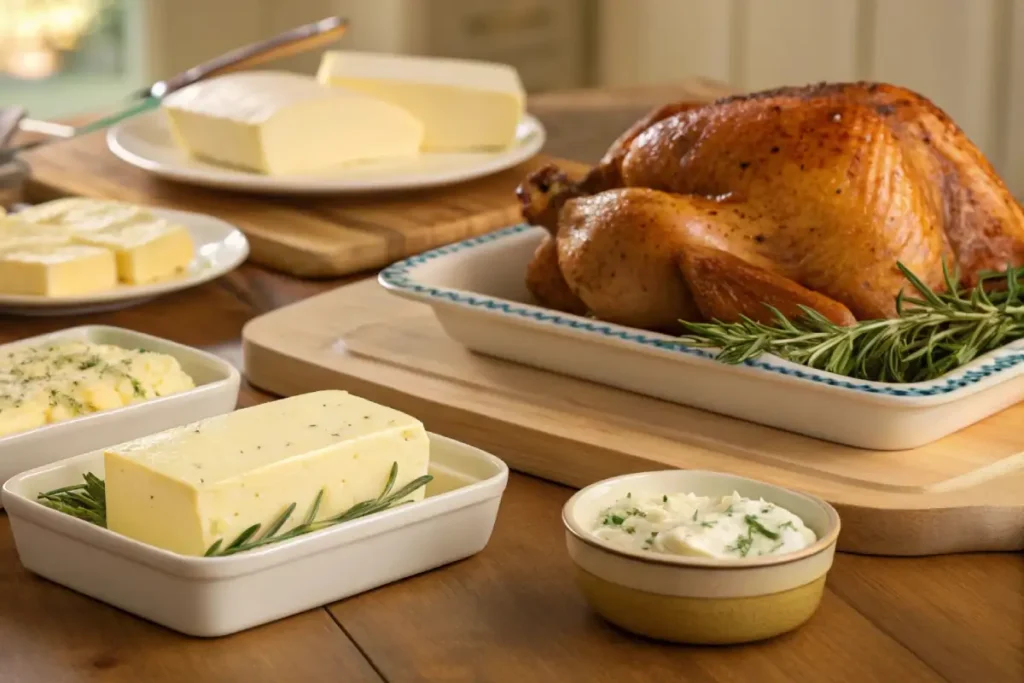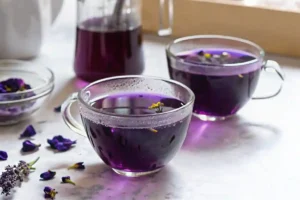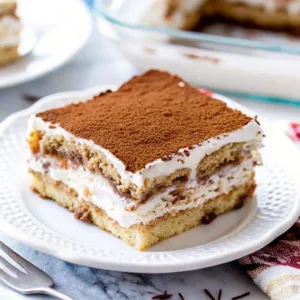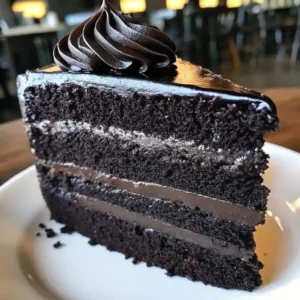Table Of Contents
Table of Contents
Which butter is best for turkey? Butter is an essential ingredient in preparing a turkey that’s delicious, moist, and golden brown. It enhances the bird’s flavor while also helping to seal in moisture, particularly during long cooking methods like smoking or roasting. From crispy skin to succulent meat, choosing the right butter ensures that the turkey isn’t just visually appealing but also incredibly flavorful and juicy.
Enhancing Flavor and Moisture Using Butter
Butter isn’t only a flavor enhancer. it’s also an agent for spices, herbs, and aromatics. If it’s flavored with rosemary and garlic or mixed with zesty citrus butter is a great source for personalization. It also helps to gently baste the turkey while it melts, which ensures an even cooking process and delicious final product.
Types of Butter for Turkey
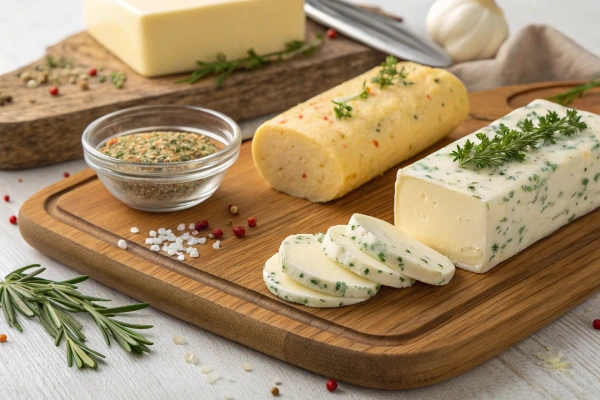
Unsalted vs. Salted Butter – Which One Works Better?
Unsalted butter is generally the go-to choice for preparing turkey. It gives you full control over the salt content, allowing you to season the turkey according to your preference. Pre-salted butter can make it challenging to balance flavors, especially if you’re using a brine or rub that already contains salt.
Salted butter, however, can be convenient if you’re short on time and want a quick seasoning option. But be cautious—it might lead to overly salty skin if combined with other salted ingredients.
Verdict: Unsalted butter wins for precision, while salted butter works best for simplicity.
Clarified Butter – A Game-Changer for Crispier Skin
Which butter is best for turkey? If you’re aiming for super-crispy skin, clarified butter—also known as ghee—is an excellent option. Because it lacks milk solids, clarified butter has a higher smoke point, making it perfect for high-temperature cooking. It resists burning and ensures the turkey’s skin turns gorgeously golden without becoming bitter or black.
Why Choose Clarified Butter?
- Higher smoke point (ideal for roasting and grilling)
- Longer shelf life compared to regular butter
- The rich, nutty flavor complements turkey
Compound Butter – Adding Flavor with Herbs and Spices
Compound butter is simply butter mixed with herbs, spices, and other flavoring agents. It’s one of the most effective ways to infuse flavor directly into the turkey. By rubbing compound butter under the skin, you allow the flavors to penetrate deep into the meat as it cooks.
Popular Compound Butter Recipes:
- Garlic Herb Butter – Parsley, thyme, garlic, and lemon zest.
- Spicy Cajun Butter – Smoked paprika, cayenne, garlic powder, and chili flakes.
- Citrus Butter – Orange zest, lemon zest, and rosemary.
Pro Tip: Prepare compound butter a day in advance to allow the flavors to meld perfectly.
Choosing the Right Butter Based on the Cooking Method
Roasting – Best Butter Options for Oven Cooking
Which butter is best for turkey? When roasting, unsalted butter or clarified butter works best. Unsalted butter allows better control over seasoning, while clarified butter prevents burning. Compound butter is also an excellent choice, as it melts gradually, releasing rich flavors into the meat and skin.
Key Tips for Roasting with Butter:
- Rub softened butter under the skin for direct flavor infusion.
- Baste the turkey every 30 minutes with melted butter for added moisture.
- Add butter pats over the breast for richer flavor and a glistening finish.
Smoking – Ideal Butter for Low-and-Slow Cooking
Smoking a turkey requires butter that can handle long cooking times without breaking down. Clarified butter or ghee is perfect here due to its stability at higher temperatures. Additionally, smoky herbs like sage and thyme can be mixed into compound butter to complement the smoky flavor.
Pro Tip: Use a butter injection to keep the meat juicy during extended cooking.
Grilling – Butter Selection for Grilled Turkey
Grilling exposes the turkey to direct heat, so clarified butter is again the best choice to avoid burning. However, for smaller portions like turkey breasts, compound butter can add rich layers of flavor when melted over the meat after grilling.
Grilling Tips with Butter:
- Brush melted clarified butter over the turkey during grilling for extra crispiness.
- Use herb-infused butter to baste frequently for smoky flavor depth.
Butter Quality and Ingredients
Organic Butter – Is It Worth It?
Organic butter is gaining popularity with those who cook for health. It is made from the milk of cows that are not fed synthetic hormones or antibiotics, making it a more sustainable and ethical alternative. When considering which butter is best for turkey, organic butter stands out for its rich, savory flavor, often attributed to the grass-fed diets of cows.
Benefits of Organic Butter for Turkey:
- Free of harmful chemicals and added ingredients.
- High in Omega-3 Fatty Acids as well as vitamin K2.
- Enhances the flavor of turkey.
But, organic butter might be more expensive than other brands. If you don’t have a budget it’s well worth the investment to enjoy the flavor as well as health advantages.
Grass-Fed Butter – Health Benefits and Taste
Grass-fed butter is made from the milk of cows that graze on pasture. It’s loaded with nutrients like beta-carotene, vitamin A, and conjugated linoleic acid (CLA), which may promote heart health.
Why Choose Grass-Fed Butter?
- A creamier texture and a more richer flavor.
- A healthier fat composition when compared to butter that is fed with grains.
- A subtle sweetness is added to turkeys for brushing or basting.
This butter is great for making compound mixtures or to use underneath the skin of the turkey since it melts wonderfully and penetrates the meat.
Cultured Butter – Adding Depth of Flavor
Cultured butter is made by fermenting live bacteria before being churned. This gives it a slightly tangy and bitter flavor. It’s a great choice for cooks who want to create a more complex and flavorful variation in their Turkey.
Best Uses for Cultured Butter in Turkey Preparation:
- Combine herbs and garlic to make compound butter.
- Use it in gravies and sauces to add flavor.
- Apply the cream to the skin for some tanginess that is subtle.
Although it’s not as popular as regular butter cultured butter can help make your bird’s appearance stand out.
Techniques for Applying Butter
Rubbing Butter Under the Skin – Tips and Tricks
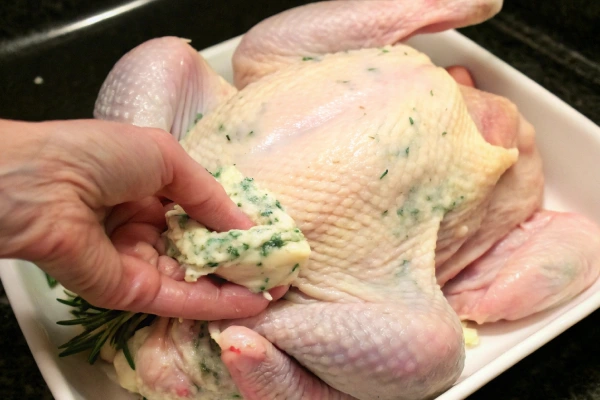
Rubbing butter under the skin ensures the flavors penetrate the meat directly. This technique also prevents the butter from simply sliding off during roasting.
How to Rub Butter Under the Skin:
- Gently separate the skin from the meat using your fingers or a spoon.
- Spread softened butter or compound butter evenly under the skin.
- Massage the skin to distribute the butter without tearing it.
For a deeper dive into whether you should put butter under the skin of your turkey, check out Should I Put Butter Under the Skin of My Turkey? Pros and Cons Revealed. It provides detailed insights into the advantages and potential drawbacks of this method.
Pro Tip: Chill the butter before rubbing for easier handling and even distribution.
Basting with Butter – How to Keep the Turkey Moist
Basting involves regularly pouring or brushing butter over the turkey while it cooks. It keeps the turkey moist and aids in the development of crisp, golden skin.
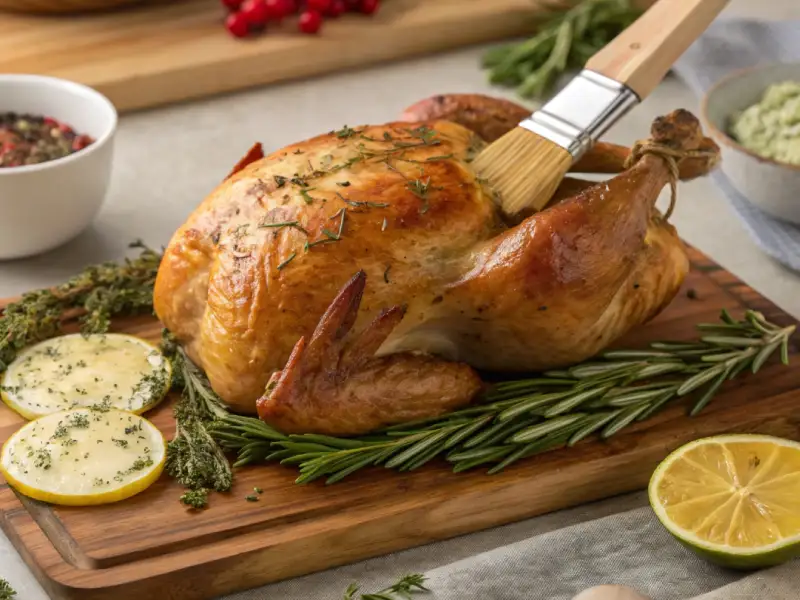
Steps for Effective Basting:
- Melt butter and add aromatics such as garlic, thyme, and rosemary.
- Sprinkle a little every 30 to 45 minutes during roasting to ensure that you don’t dry out.
- Make use of a turkey baster or a spoon to make it easy to apply.
Warning Do not open the oven too often since it may decrease the cooking temperature and prolong the cooking time.
If you’re considering the use of butter or oil for roasting, you’ll get important information in oil or Butter Which is Better in Roasting Turkey?. This guide explains the advantages and disadvantages of both options.
Butter Injection – Enhancing Flavor from the Inside
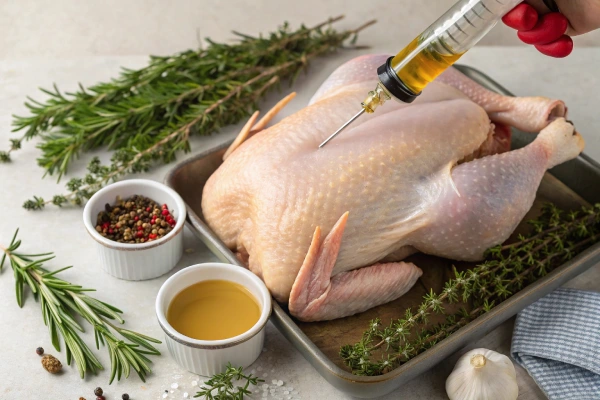
Butter injection is a sophisticated method of introducing flavor into the meat of the turkey. It’s particularly beneficial when the bird is larger, and the seasoning on the surface may not be able to penetrate enough.
How to inject Butter in Turkey:
- Melt butter, then mix it with broth or spices to enhance flavor.
- Inject a meat injector full of the butter mix.
- Inject into the largest areas of the turkey like the breast and the thighs.
The Pro-Tip To inject the turkey, do it 24 hours before the date of your choice so that the flavors can be completely absorbed.
Butter Alternatives for Turkey
Olive Oil and Ghee – Are They Good Substitutes for Butter?
Ghee and olive oil make an excellent alternative to butter.
- Olive Oil: It is a heart-healthy alternative and is great to bast, however it lacks the buttery taste.
- Ghee Ghee HTML0: A clarified butter alternative with an increased smoke point, ideal for crisper skin and richer flavor.
Best Uses for Alternatives:
- Ghee to roast with high heat.
- Olive oil is a great oil to use for basting or the marinating of turkey bits.
Vegan Butter Options – Plant-Based Alternatives
If you prefer vegetarian cooking vegan butter can give amazing results. Made from coconut oil avocado, coconut, or soy vegan butter can be akin to the texture and flavor of regular butter.
Benefits of Vegan Butter:
- It is dairy-free and safe for vegetarians as well as lactose-intolerant people.
- It is possible to infuse it with spices and herbs for alternative compounds to butter.
- It is available in salted as well as unsalted types to suit different cooking needs.
Tips for the Pro Choose vegan butter that has a high fat content to get better flavor absorption as well as crisper skin.
FAQs About Which butter is best for turkey?
Is salted or unsalted butter better for turkey?
Unsalted butter is ideal for turkey because it lets you control the salt level, especially if you’re brining. If using salted butter, skip adding extra salt to avoid over-seasoning.
What kind of butter do you use for Christmas turkey?
For holiday flair, mix unsalted butter with fresh herbs like rosemary, thyme, or sage. Add minced garlic or orange zest for extra flavor, then rub it under the skin for a juicy, aromatic turkey.
Is it better to put butter or oil on a turkey?
Butter adds rich flavor and moisture, but it burns faster. For crispier skin, brush the turkey with oil first, then tuck herb butter under the skin. Best of both worlds!
How to get butter to stick to turkey?
Pat the turkey skin dry first. Soften the butter to a spreadable texture, then gently lift the skin with your fingers and rub it directly onto the meat. For the outside, press butter into crevices or mix it with oil for better adhesion.
Final Thoughts on Choosing the Best Butter for Turkey
When it comes to making the perfect turkey butter is an essential ingredient that can determine the texture, flavor, and overall appearance of your meal. From the traditional richness of unsalted butter to the rich, nutty taste of clarified butter as well as the aromatic mix made of compound butter, the possibilities are limitless.
If you enjoy playing around with compound butter, spices, and herbs can elevate the turkey to become a gourmet masterpiece. If you’re looking to get the health benefits of butter without sacrificing flavor, organic and grass-fed butter is the top choice. Clarified butter, as well as Ghee, are great for creating crispy, golden skin that doesn’t risk burning.
The choice of butter is largely dependent on the cooking method: smoking, roasting, or grilling. Each technique is compatible with various types of butter to ensure that you get the desired flavor and texture.
Looking for more tasty recipes and cooking inspiration? Connect with us on Facebook at Dashtasty and become part of our foodie family.
